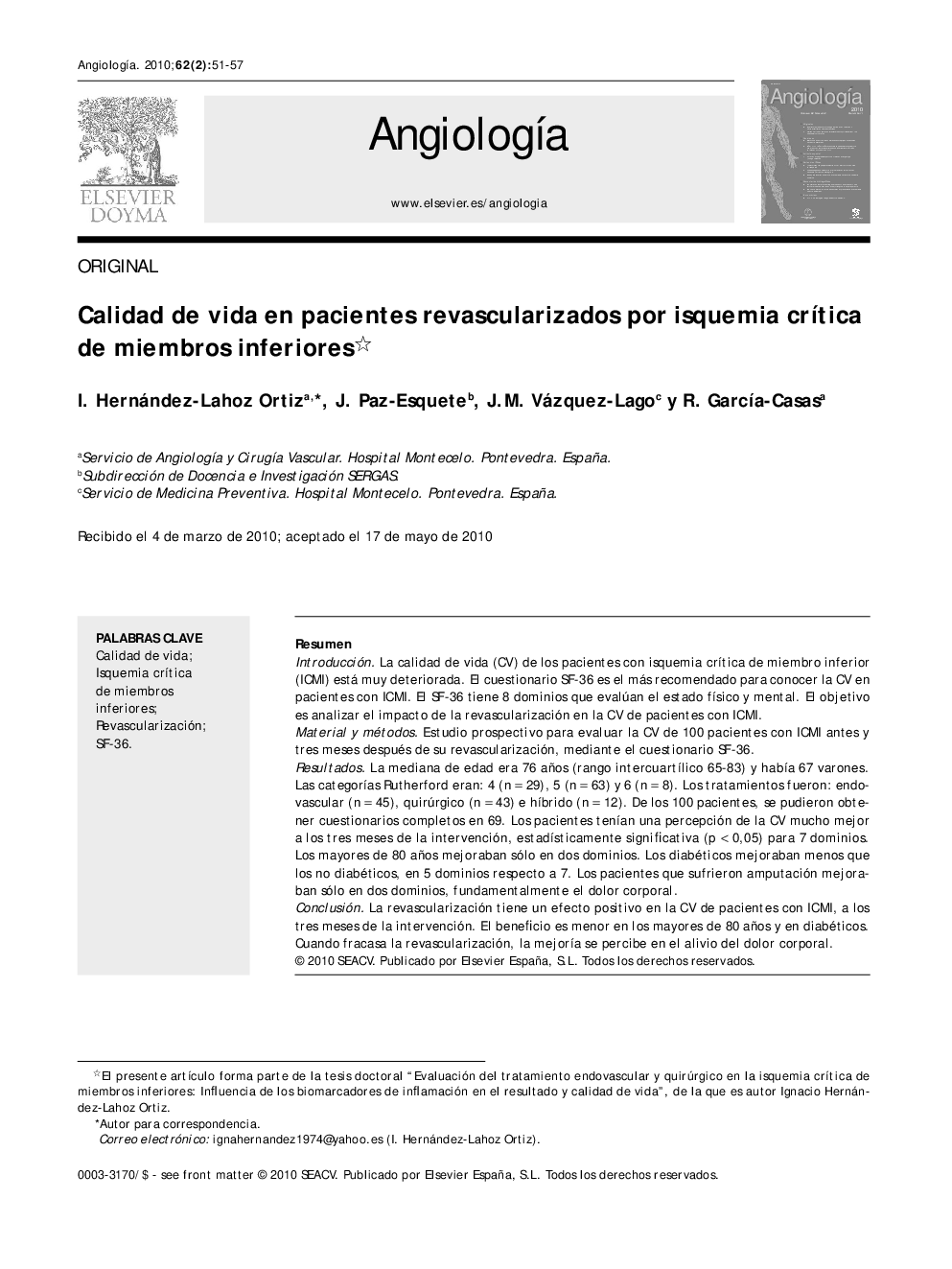| کد مقاله | کد نشریه | سال انتشار | مقاله انگلیسی | نسخه تمام متن |
|---|---|---|---|---|
| 2867871 | 1171117 | 2010 | 7 صفحه PDF | دانلود رایگان |

ResumenIntroducciónLa calidad de vida (CV) de los pacientes con isquemia crítica de miembro inferior (ICMI) está muy deteriorada. El cuestionario SF-36 es el más recomendado para conocer la CV en pacientes con ICMI. El SF-36 tiene 8 dominios que evalúan el estado físico y mental. El objetivo es analizar el impacto de la revascularización en la CV de pacientes con ICMI.Material y métodosEstudio prospectivo para evaluar la CV de 100 pacientes con ICMI antes y tres meses después de su revascularización, mediante el cuestionario SF-36.ResultadosLa mediana de edad era 76 años (rango intercuartílico 65–83) y había 67 varones. Las categorías Rutherford eran: 4 (n = 29), 5 (n = 63) y 6 (n = 8). Los tratamientos fueron: endovascular (n = 45), quirúrgico (n = 43) e híbrido (n = 12). De los 100 pacientes, se pudieron obtener cuestionarios completos en 69. Los pacientes tenían una percepción de la CV mucho mejor a los tres meses de la intervención, estadísticamente significativa (p < 0,05) para 7 dominios. Los mayores de 80 años mejoraban sólo en dos dominios. Los diabéticos mejoraban menos que los no diabéticos, en 5 dominios respecto a 7. Los pacientes que sufrieron amputación mejoraban sólo en dos dominios, fundamentalmente el dolor corporal.ConclusiónLa revascularización tiene un efecto positivo en la CV de pacientes con ICMI, a los tres meses de la intervención. El beneficio es menor en los mayores de 80 años y en diabéticos. Cuando fracasa la revascularización, la mejoría se percibe en el alivio del dolor corporal.
BackgroundCritical limb ischaemia (CLI) has a great effect on the quality of life (QoL) of the patients. The SF-36 questionnaire is the most recommended tool to assess the QoL of patients with CLI. It has 8 sub-scales to evaluate the physical and mental state. The aim of the study is to analyse the impact of revascularisation on the QoL of patients with CLI.MethodsA prospective study was performed to evaluate the QoL of 100 patients with CLI. Assessment was made before and three months after revascularisation, using the SF-36 questionnaire.ResultsThe median age was 76 years (interquartile range 65–83) and there were 67 males. Rutherford categories were as follows: 4 (n = 29), 5 (n = 63) and 6 (n = 8). Treatment modalities were: endovascular (n = 45), surgical (n = 43) and hybrid (n = 12). Complete questionnaires were obtained from 69 patients. Overall, the QoL of patients improved significantly (p < 0.05) three months after arterial reconstruction in 7 sub-scales. Patients over 80 years improved in only two sub-scales. Diabetic subjects improved less than non-diabetics (in 5 sub-scales versus 7). Patients with an amputation improved in only two sub-scales, mainly body pain.ConclusionRevascularisation procedures have a positive effect on the QoL of patients with CLI three months after the intervention. Diabetic subjects and patients over 80 benefit less. When revascularisation fails, the improvement is mainly in the relief of body pain.
Journal: Angiología - Volume 62, Issue 2, March–April 2010, Pages 51–57